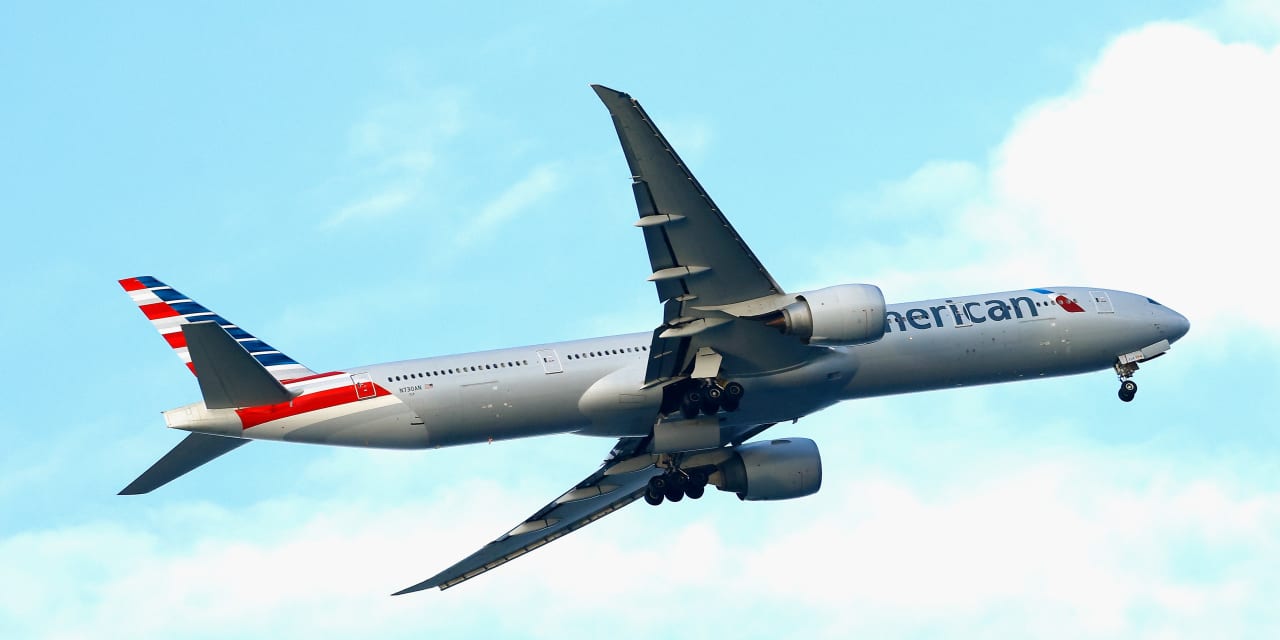Airline stocks have been battered on a number of concerns, but they’re too cheap to ignore now.
The
U.S. Global Jets
exchange-traded fund (JETS) tracks
Delta Air Lines
(ticker: DAL),
United Airlines Holdings
(UAL),
JetBlue Airways
(BLU),
American Airlines Group
(AAL), and others. The ETF has dropped about 27% from the $22 year high set in July, weighed down by higher oil prices on the back of the conflict in Israel. Fuel is a major cost for airlines, and increases squeeze the profit margins. In addition, the entire stock market has dropped since late July on concerns about slowing economic demand and sales growth in the face of persistent high interest rates.
Analysts have trimmed aggregate 2024 sales estimates for companies in the airline ETF by 0.2%, according to FactSet. But they’ve slashed 2024 earnings estimates by 23%, according to FactSet, as margins could get hit.
The fact that the stocks are down more than the drop in earnings estimates means the multiples of next year’s earnings per share that the shares trade at have fallen, too. The ETF’s multiple has come down to 8.6 times estimated next-12-months earnings from 9.3 times about three months ago.
It’s uncertain when and how quickly fundamentals will improve, but the worst may already be reflected in the stocks. The ETF is trading at roughly half the
S&P 500’s
price/earnings multiple. That’s a steep discount, and although the ETF has traded at a steeper discount in the past, It’s also traded at multiples closer to that of the index when airlines are more in favor with investors.
In fact, buyers are beginning to step in, and the ETF rose to about $16 Tuesday morning even with the U.S. indexes down a touch. The $15 or $16 level is where buyers have consistently stepped in to support the ETF many times after selloffs since the summer of 2020.
“If you look at the airlines as a group, since they’ve cut numbers, they’ve [the stocks] been more stable,” said Doug Bycoff, chief investment officer of the Bycoff Group.
That support is no surprise, as United Airlines is set to report earnings after the market close Tuesday—and the report could be a strong one. Lowered earnings estimates could make for an easy beat of expectations, which could lift the stock which has already dropped about 30% from its July peak.
Plus, if Delta’s strong earnings report on Oct. 12 is any indication—sales of $14.6 billion rose 13% year over year and the company highlighted “steady” demand at home and overseas—United’s revenue could help profits surpass expectations.
American Airlines reports earnings on Thursday morning.
Earnings certainly matter, but the other factor that could also lift airlines shares is the price of oil. WTI Crude oil is up to the high $80s per barrel, but it has consistently gotten knocked lower from the low $90s area in the past year or so. If geopolitical tensions ease, oil could drop harshly from here, but even if it avoids a step decline, it will have a difficult time surpassing low $90s without a sudden surge in global economic demand. That puts a floor under profit-margin estimates for airlines.
Taking a chance on airline stocks now could provide some lift to one’s portolio.
Write to Jacob Sonenshine at [email protected]
Read the full article here











Leave a Reply